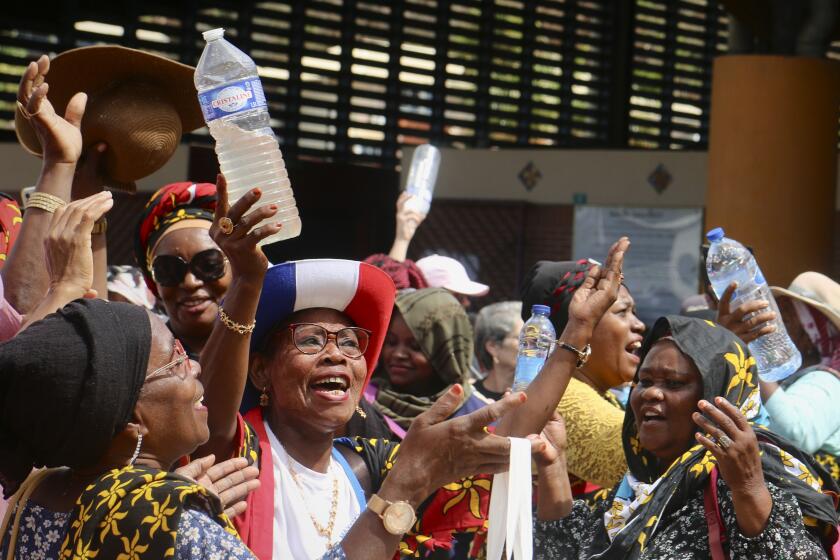Authorities impose overnight curfew in cyclone-ravaged Mayotte as France rushes in aid

- Share via
SAINT-DENIS, Reunion — French authorities Tuesday announced an overnight curfew for Mayotte as they sought to stabilize the island territory in the aftermath of Cyclone Chido, the most intense storm to hit the Indian Ocean archipelago in 90 years.
The French military said it is sending four to five planes a day with up to 50 tons of assistance, including food, water and medicine. Hundreds of military personnel have arrived since the weekend in Mayotte, an island group off Africa that is France’s poorest territory.
The official death toll from Saturday’s cyclone rose to 22, according to the latest report from Mayotte Hospital quoted by Ambdilwahedou Soumaila, the mayor of the capital, Mamoudzou.
Newly appointed Prime Minister Francois Bayrou provided an update later Tuesday saying that more than 1,500 people were injured, including more than 200 critically. Authorities fear hundreds and possibly thousands of people have died.
French President Emmanuel Macron will travel to Mayotte on Thursday, his office said. “Our compatriots are living through the worst just a few thousand kilometers away, and I will be by their side in a few hours in Mayotte,” Macron said in a statement.
“The priority today is water and food,” Soumaila told RFI radio, adding that “there are people who have unfortunately died where the bodies are starting to decompose that can create a sanitary problem.”
The curfew requires people to stay in their homes between 10 p.m. and 4 a.m. as authorities try to prevent looting of damaged buildings.
“We don’t have electricity. When night falls, there are people who take advantage of that situation,” Soumaila said.
Mayotte in the southeastern Indian Ocean off the coast of Africa is France’s poorest island and the poorest territory in the European Union.
Many of the victims are believed to be migrants
Speaking on France Inter radio Tuesday morning, Mayotte lawmaker Estelle Youssouffa described the challenges in accounting for victims, especially among migrants.
“The real toll of those swept away by the mud, winds and tin from shanty towns will never be known,” Youssouffa said. “This population, by definition undocumented migrants, are the main victims of this tragedy because they feared going to shelters.”
Youssouffa shared a harrowing account from an imam she spoke to Monday, who reported burying more than 30 people in a single day in La Vigie, a makeshift settlement.
“I don’t even know if these figures are included in the official count,” Youssouffa said.
Soumaila, Mamoudzou’s mayor, said he planned to visit areas hit hardest by the cyclone on Tuesday, where survivors are still reeling from the destruction. Nearly 70% of Mayotte’s population has been impacted, with entire neighborhoods reduced to rubble.
The latest report from the French Interior Ministry says that 80% of telecom services were down, making communication on the archipelago difficult. The International Federation of Red Cross and Red Crescent Societies said it has lost contact with more than 200 volunteers on the ground.
French military aircraft were delivering water and food daily. The island’s main hospital remains severely damaged, and a field hospital is expected to arrive Thursday.
Risk of epidemics
The head of the medical aid group Medecins du Monde (MDM), or Doctors of the World, told the Associated Press he was concerned about the risk of a cholera epidemic in Mayotte. Earlier this year, the island was hit by an outbreak of a highly drug-resistant strain of the disease.
“Cholera is circulating,” MDM Director Jean-Francois Corty said in a phone interview from Paris. “It might turn into an epidemic if there is no way to ensure efficient access to water.”
The government is pinning its hopes on the upcoming rainy season, though residents say it won’t be enough to fix the deep-seated water problems.
Only six health centers out of 20 in Mayotte are still functioning, making it a challenge to handle not just those injured in the cyclone, but also regular emergencies and chronic diseases, Corty said.
Meanwhile, the government released an initial $687,000 to finance urgent needs on the island. Paris Mayor Anne Hidalgo has pledged $262,000 from the city’s emergency fund for recovery efforts.
Cyclone Chido is the deadliest storm to strike the territory in nearly a century, underscoring the vulnerability of the island’s impoverished population.
The prime minister rejects criticism of his handling of the crisis
The cyclone is also threatening to escalate political tensions in France. Just days after taking office, Bayrou has faced criticism from across the political spectrum for his handling of the crisis. Critics have taken issue with his decision not to travel to Mayotte or attend a crisis meeting in person, choosing instead to chair a town hall in Pau, where he serves as mayor.
Bayrou responded by saying he participated in the crisis meeting via video and worked closely with Interior Minister Bruno Retailleau, who was in Mayotte. He explained that his focus has been on forming a new government.
Bayrou also announced a call for innovative housing projects, seeking designs for “easy-to-assemble” and “affordable” structures to aid in reconstruction.
“French companies and architecture schools will undoubtedly contribute to reshaping Mayotte,” Bayrou said.
He dismissed calls to declare a state of emergency on the archipelago, suggesting instead that Mayotte use European Union recovery funds and national solidarity initiatives. He highlighted the temporary field hospital set up by the French army to prevent disease outbreaks as a key example of ongoing support.
“We rebuilt Notre Dame in five years,” Bayrou said. “We’ve got less time than that to restore normal living conditions in Mayotte.”
Surprenant and Nouvian write for the Associated Press and reported from Saint-Denis and Paris, respectively. AP writers Monika Pronczuk and Samuel Petrequin contributed to this report.
More to Read
Sign up for Essential California
The most important California stories and recommendations in your inbox every morning.
You may occasionally receive promotional content from the Los Angeles Times.












